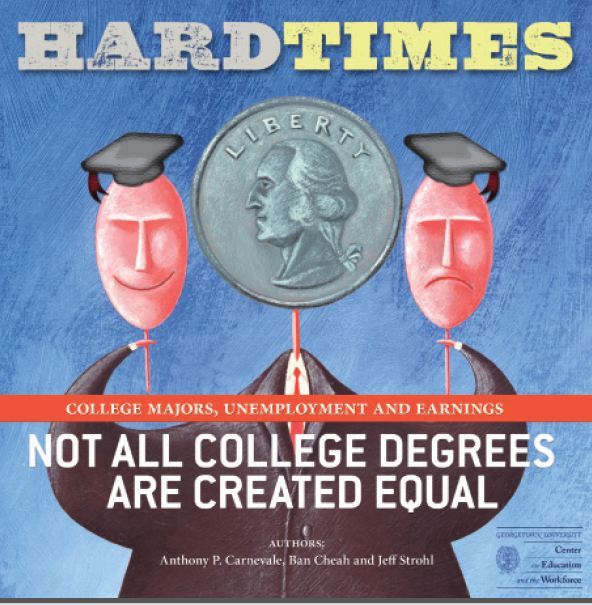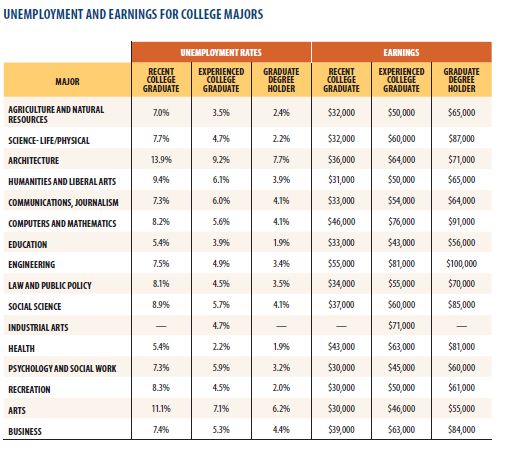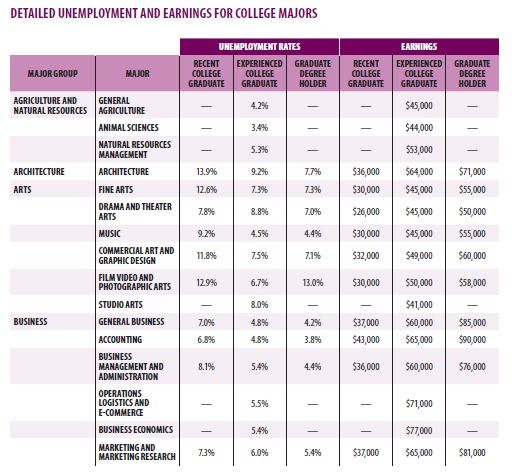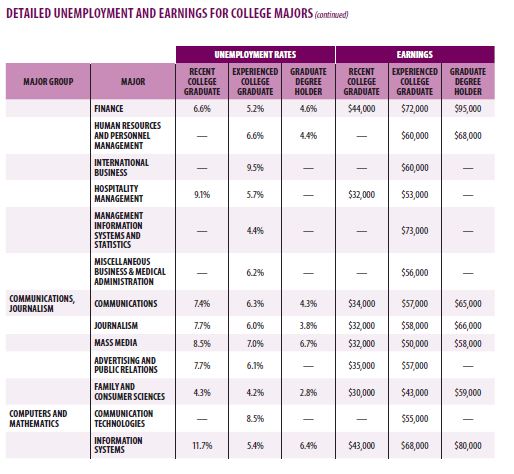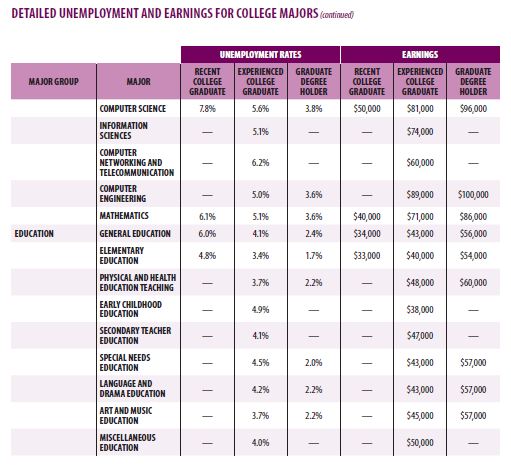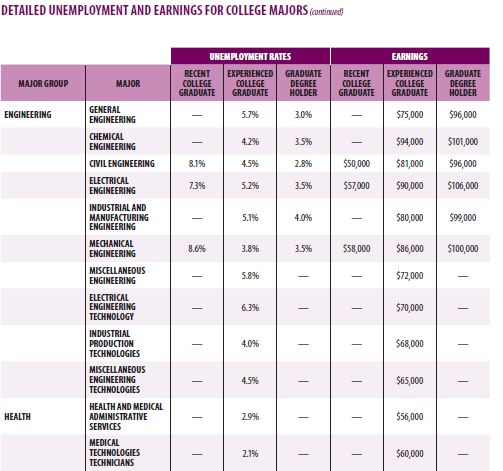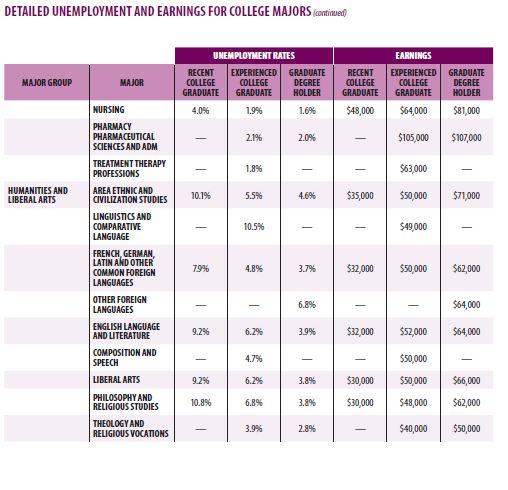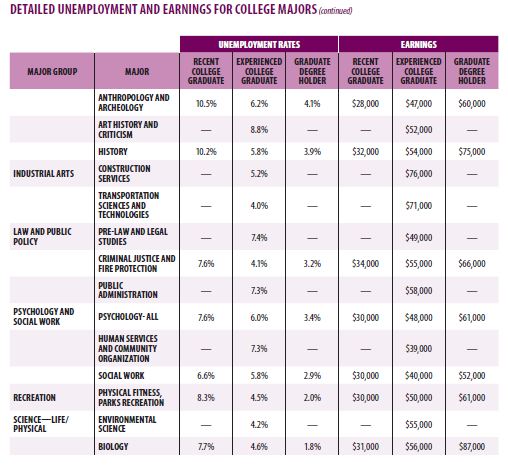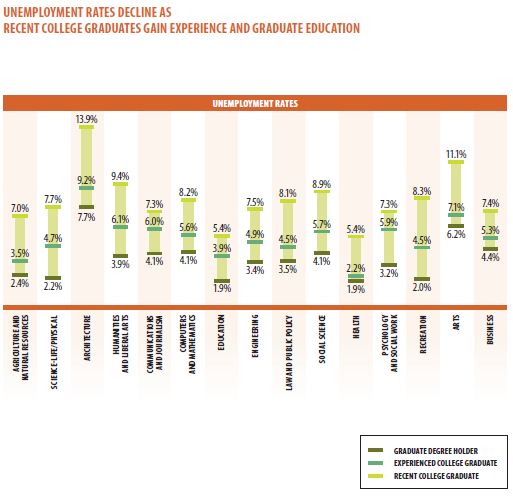

| Visitors Now: | |
| Total Visits: | |
| Total Stories: |

| Story Views | |
| Now: | |
| Last Hour: | |
| Last 24 Hours: | |
| Total: | |
Where The Jobs Are Revealed In New Report From Georgetown University
left by the Great Recession, is unavoidable: “Is college worth it?” Our answer:
“Yes, extensive research, ours included, finds that a college degree is still
worth it.” A Bachelor’s degree is one of the best weapons a job seeker can
wield in the fight for employment and earnings. And staying on campus to earn a
graduate degree provides safe shelter from the immediate economic storm, and
will pay off with greater employability and earnings once the graduate enters
the labor market. Unemployment for students with new Bachelor’s degrees is an
unacceptable 8.9 percent,1 but it’s a catastrophic 22.9 percent for job seekers
with a recent high school diploma—and an almost unthinkable 31.5 percent for
recent high school dropouts.
college students should consider as they choose their courses:
depends on their major. The unemployment rate for recent graduates is
highest in Architecture (13.9 percent) because of the collapse of the construction
and home building industry in the recession. Unemployment rates are generally
higher in non-technical majors, such as the Arts (11.1 percent), Humanities and
Liberal Arts (9.4 percent), Social Science (8.9 percent)1 and Law and Public
Policy (8.1 percent).
vary widely depending on the technical and scientific content of the major.
Employers are still hiring technical computer specialists who can write
software and invent new applications. But for information specialists who use
software to manipulate, mine, and disseminate information, hiring slows down in
recessions. We can see the difference in unemployment between people who invent
computer technology as opposed to people who use computer technology. The
unemployment rate for recent college graduates in Information Systems has
spiked to 11.7 percent, while the rates for majors in Computer Science and
Mathematics are 7.8 percent and 6.0 percent, respectively.
recovery proceeds. For example, the unemployment rate for recent college
graduates who major in information systems is a hefty 11.7 percent, but only
5.4 percent for experienced workers who major in Information Systems.
Services industries have been the most stable employers for recent college
graduates. Unemployment rates are relatively low (5.4 percent) for recent
college students who majored in Healthcare and Education because these majors
are attached to stable or growing industry sectors. Recent graduates in Psychology
and Social Work have relatively low unemployment rates (7.3 percent) nearly
half work in Healthcare and Education. The same is true for unemployment among
recent college graduates who majored in the Life and Physical Sciences (7.7
percent). More than 60 percent of these recent college graduates who are
working have landed in the Healthcare, Professional Contracting Businesses or
Education sectors.
with the exception of those who specialize in Hospitality Management (9.1
percent), which is hampered by the ongoing slump in Travel and Tourism.
Similarly, recent graduates in Engineering do relatively well (7.5 percent
unemployment), except for Civil and Mechanical Engineers who are still suffering
from the deep dive in manufacturing and construction activity.
occupations and industries tend to experience lower unemployment rates. Majors
such as Healthcare, Education and those related to technical occupations tend
to have lower unemployment rates than more general majors, like Humanities and
Liberal Arts, where graduates are broadly dispersed across occupations and
industries. Unemployment rates for recent graduates in Healthcare and Education
are 5.4 percent compared to 9.4 percent for people who majored in Humanities
and the Liberal Arts. More than three out of four people who major in Education
work in the Education industry while no more than 20 percent of Liberal Arts
graduates are concentrated in any single industry.
occupations and industries can misfire. For example, tying oneself to a
particular major can be a problem if the associated occupations or industries
collapse. Unemployment rates for recent college graduates who majored in Architecture
start high at 13.9 percent and, due to its strong alignment with the collapse
in construction and housing, unemployment remains high even for experienced
college graduates at 9.2 percent.
gain access to work, especially in their major fields, their unemployment rates
will drop substantially. Employment patterns among experienced workers who
have been out of college for a while suggest that recent graduates will fare
better as the recovery continues. With the exception of majors in Architecture,
International Business and Theater Arts, more experienced workers have
substantially lower unemployment rates and higher earnings than recent college
graduates.
prospects across all majors. Sometimes, when unemployment is high, the best
strategy to increase future employability is to go to graduate school. The
unemployment rate for people with graduate degrees is 3 percent compared with a
5 percent unemployment rate for those with a BA (recent college graduates and
experienced workers holding a Bachelor’s degree). With the exception of majors
in the arts and Architecture, unemployment rates for people with graduate
degrees range between 1.9 percent and 4.0 percent. Graduate degrees tend to
outperform BA’s on employment in part because advanced degrees represent higher
levels of human capital development and because those degrees are more closely aligned
with career pathways in particular occupations and industries.
take. Median earnings among recent college graduates vary from $55,000 among
Engineering majors to $30,000 in the Arts, as well as Psychology and Social
Work. In our more detailed data—which drills into the broad categories to
look at results for more individual, specialized majors—the variation is even
more pronounced, ranging from $60,000 for Computer Engineering graduates to
$24,000 for Physiology majors.
content tend to earn the most among both recent and experienced college
graduates. Engineering majors lead both in earnings for recent and
experienced college graduates followed by Computer and Mathematics majors, and
Business majors. Recent graduates in Healthcare majors start out with high
earnings, but begin to lose ground to Science, Business and Engineering as
college graduates gain experience and graduate degrees. Graduate school further
differentiates earnings among majors.
industries and occupations tend to have low unemployment rates but not
necessarily the highest earnings. Some majors offer both high security and
high earnings, while other majors trade off earnings for job security.
Healthcare, Science and Business majors have both low unemployment and the
highest earnings boostfrom experience and graduate education. At the same time,
Education, Psychology and Social Work majors have relatively low unemployment,
but earnings are also low and only improve marginally with experience and
graduate education.
Although differences remain high among majors, graduate education raises earnings across the board. The average earnings for BA’s now stands at $48,000 compared with $62,000 for graduate degrees. With the exception the Arts and Education, earnings for graduate workers range between $60,000 and $100,000.
It is easy to look at unemployment rates for new college graduates or hear stories about degree-holders forced to tend bar and question the wisdom of investing in higher education when times are bad. But those questions should last only until you compare how job seekers with college degrees are doing compared to those without college degrees.
Today’s best advice, then, is that high school students who can go on to college should do so— with one caveat. They should do their homework before picking a major because, when it comes to employment prospects and compensation, not all college degrees are created equal.
Get the complete Georgetown University report here:
http://www9.georgetown.edu/grad/gppi/hpi/cew/pdfs/Unemployment.Final.update1.pdf
2012-10-20 15:23:53
Source: http://nanopatentsandinnovations.blogspot.com/2012/10/where-jobs-are-revealed-in-new-report.html
Source:



